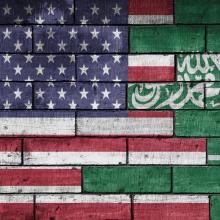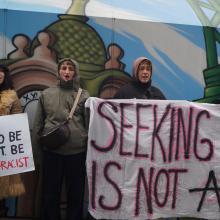March 22, 2019

On March 14, 2019, the UN Human Rights Council (HRC) adopted Jordan’s outcome report after the country’s human rights record was reviewed last year.
During its Universal Periodic Review (UPR) on November 8, 2018, Jordan received 226 recommendations from other UN Member States, and announced shortly thereafter that it had accepted 131 of these recommendations, “noting” 74 others.
Jordan announced that it would respond to the 21 remaining recommendations ahead of the 40th session of the HRC, which began on February 25, and proceeded to submit an evaluation in which it endorsed 16 of the recommendations and noted 5. However, MENA Rights Group is concerned that Jordan’s evaluation provides an unrealistic analysis of the current human rights situation in the country, particularly with regards to the practice of torture, the right to freedom of expression, counter-terrorism measures, administrative detention, and the principle of non-refoulement.
Jordan responded to a number of recommendations on these issues by stating that the country’s laws and practices already meet international standards, despite evidence to the contrary. As a result, MENA Rights Group fears that the responses transmitted to the Human Rights Council illustrate the government’s lack of political will to tackle serious human rights concerns, thereby undermining its ability to fulfil the commitments taken during its latest UPR.
The criminalisation of torture
Jordan responded positively to the recommendations made by Chile and Mexico to define the crime of torture in accordance with the provisions of the UN Convention against Torture (UNCAT). Yet, when urged to modify its Penal Code so that torture is categorised as a serious crime, Jordan explained that the Penal Code was reformed in 2018 as part of the criminal justice reform.
As part of this reform, the minimum penalty for torture was increased from three months’ imprisonment to one year. Nevertheless, this penalty is still not commensurate with the gravity of the crime, as it would normally be attached to a misdemeanour, and the crime of torture is subjected to statutes of limitation.
Such a shortcoming is all the more concerning considering the lack of an independent complaint mechanism for receiving and dealing with cases of alleged torture or ill-treatment, as well as the low number of investigations and prosecutions relating to such cases. In addition, cases of torture are still overseen by police and military courts, whose proceedings are neither independent nor transparent.
Offline and online freedom of expression
Several countries recommended that Jordan amend laws that impede freedom of expression and information – including the 2015 Cybercrime Law – to ensure compliance with article 19 of the International Covenant on Civil and Political Rights (ICCPR). Although the authorities acknowledged these discrepancies – supposedly addressed by a special Committee – they affirmed that “no citizen or journalist shall be arrested or prosecuted in connection with a case of opinion or expression.”
However, in law and in practice, journalists can be imprisoned for print articles if they appear online, since the Cybercrime Law states that internet users can face jail terms and fines if they are found guilty of defamation on social media or online media outlets. In addition, the Penal Code contains several speech offences, such as insulting a foreign state or members of the Jordanian royal family, along with encouraging “the contestation of the political system”.
In January 2017, the Ministry of Justice proposed amendments to the 2015 Cybercrime Law explicitly addressing “hate speech”. In June 2018, the government approved the changes before presenting them to the parliament. On December 9, 2018, the government withdrew the text following domestic and international pressure. Following an appeal by MENA Rights Group on November 15, 2018, the UN Special Rapporteur on the promotion and protection of the right to freedom of opinion and expression urged the government to revise the proposed amendments.
On December 11, 2018, the executive introduced alternative amendments before the parliament without any prior consultation of civil society organisations. In its submission to the HRC, Jordan explained that the definition of hate speech was currently being reviewed by the Parliamentary Council. Although the text has not yet been made public, there are substantial grounds to believe that the government has introduced additional provisions – such as the prohibition of “fake news” – that are not in line with international human rights standards governing freedom of expression online.
On the protection of human rights while countering terrorism
Jordan accepted a recommendation issued by Belgium on the need to amend the Anti-Terrorism Law to bring it into line with the ICCPR, claiming at the same time that it was already in compliance with international standards. Such a statement is factually incorrect, as the latest amendments to the Anti-Terrorism Law of 2006 – which were introduced in 2014 – broadened the definition of terrorism, allowing the authorities to detain and prosecute individuals who exercise their right to freedom of expression and peaceful assembly. The UN Human Rights Committee expressed concern over this broad definition of terrorism in its latest Concluding Observations.
The practice of administrative detention
The government of Ireland recommended that Jordan limit its use of administrative detention, and Jordan responded that administrative detention is only used against individuals with a criminal background. However, many women facing domestic violence have been jailed for lengthy periods of time “for their own protection”.
The government affirmed that administrative detainees retain the right to challenge the legality of their detention. While an appeal is possible, the Human Rights Committee recently recalled that “lawyers with special qualifications are required to bring such cases and their services are expensive, and that such an appeal is a remedy with little prospect of success and is not often used in practice.”
The right to seek asylum and the enforcement of the principle of non-refoulement
Jordan claimed that the recommendation made by Argentina to deepen measures to guarantee the principle of non-refoulement is already being implemented, even if the country is not yet a party to the 1951 Convention relating to the Status of Refugees. Ahead of Jordan’s third UPR, the UNHCR recommended that Jordan adopt national legislation governing refugee and asylum matters.
Although Jordan currently hosts an estimated 1.4 million Syrian refugees, the country began to implement a more restrictive management of the border in 2014, restricting the number of new entries and profiling newcomers. In its Concluding Observations issued in 2016, the Committee against torture (CAT) denounced “reports of inconsistent border policies”, in particular Jordan’s policy not to admit Palestinian refugees fleeing the conflict in Syria.
Furthermore, in June 2016, Jordan closed its border with Syria following a terrorist attack, leaving over 80,000 refugees stranded in a desert area known as the “berm”. In addition, Human Rights Watch reported that, since 2016, Jordan has violated the principle of non-refoulement by deporting hundreds of Syrian refugees without giving them a meaningful chance to challenge their removal and failing to consider their need for international protection.






